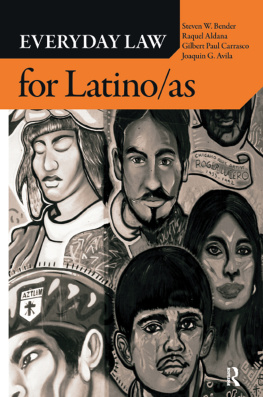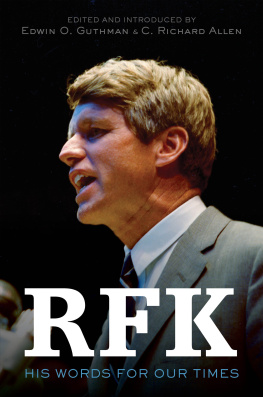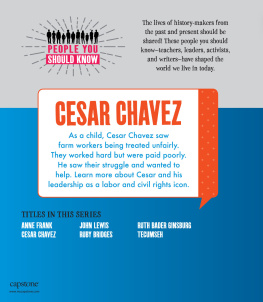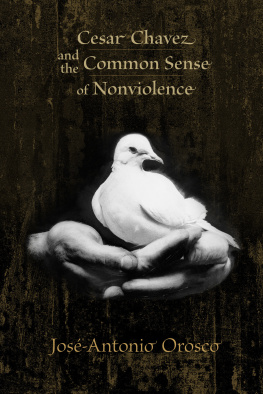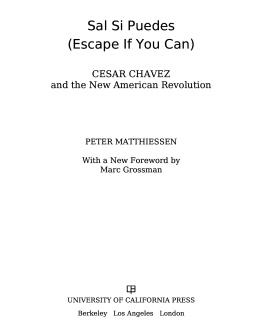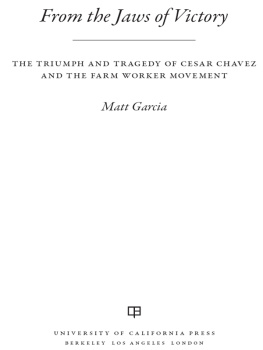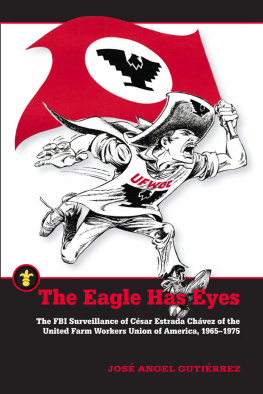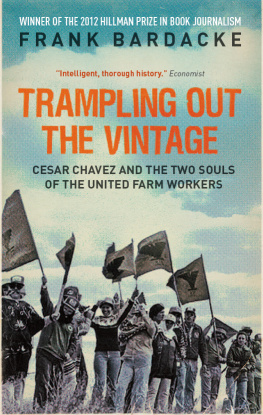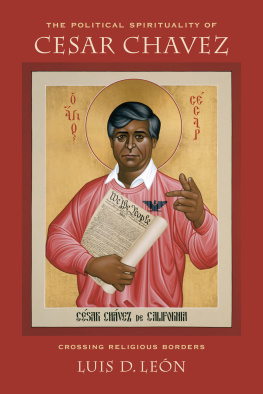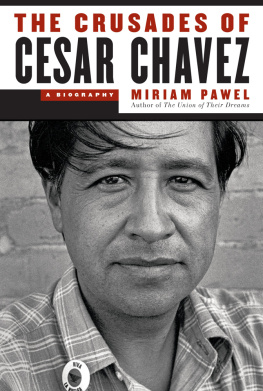One Night in America
One Night in America
Robert Kennedy, Csar Chvez,
and the Dream of Dignity
Steven W. Bender
First published 2008 by Paradigm Routledge
Published 2016 by Routledge
2 Park Square, Milton Park, Abingdon, Oxon OX14 4RN
711 Third Avenue, New York, NY 10017, USA
Routledge is an imprint of the Taylor & Francis Group, an informa business
Letters of Cesar Chavez to Robert F. Kennedy and Martin Luther King, Jr., / 2007 the Cesar E. Chavez Foundation, www.chavezfoundation.org.
Copyright 2008, Taylor & Francis
All rights reserved. No part of this book may be reprinted or reproduced or utilised in any form or by any electronic, mechanical, or other means, now known or hereafter invented, including photocopying and recording, or in any information storage or retrieval system, without permission in writing from the publishers.
Notice:
Product or corporate names may be trademarks or registered trademarks, and are used only for identification and explanation without intent to infringe.
Library of Congress Cataloging in Publication Data
Bender, Steven.
One night in America : Robert Kennedy, Cesar Chavez, and the dream of dignity / Steven W. Bender.
p. cm.
Includes bibliographical references and index.
ISBN 978-1-59451-428-9 (hardcover : alk. paper) ISBN 978-1-59451-429-6 (pbk.: alk. paper)
1. United StatesSocial conditions1960-1980. 2. Kennedy, Robert F, 19251968Friends and associates. 3. Chavez, Cesar, 1927-1993Friends and associates. 4. Mexican American agricultural laborersCaliforniaHistory20th century. 5. Mexican AmericansCaliforniaSocial conditions. I. Title.
HN65.B4236 2008
305.562dc22
2007045363
Designed and Typeset by Straight Creek Bookmakers.
ISBN: 13: 978-1-59451-428-9 (pbk)
ISBN: 13: 978-1-59451-429-6 (ebk)
I am convinced that the truest act of courage, the strongest act of
manliness is to sacrifice ourselves for others in a totally nonviolent
struggle for justice.
Csar Chvez
My heroes I know by name are few, and most of them, particularly
Csar Chvez, Robert Kennedy, and Dolores Huerta, are
connected to the events in this book. They shared a vision for a
better world for the underserved, and they resolved to pursue it as
their lifes work. So I dedicate this book to them and to those ahead
who will shoulder the struggle.
Contents
Viva la Causa: Rural Latinos and the Farm Worker
Movement
Looking Ahead: The Future of the Democratic Party
and Immigration Reform
Robert Kennedy and Csar Chvez came from opposite sides of the country and from opposite sides of the tracks of class and race that continue to divide so many Americans. But they shared a vision that the lives and promise of all Americans were unfulfilled so long as the American dream failed to extend to the desperately poor farm workers, many of Mexican heritage, who worked the fields in California, the Southwest, and elsewhere. This common bond of desire to help the underprivileged, whether in rural fields or urban ghettos and barrios, drew Chvez and Kennedy together in the 1960s in a brief but inspirational friendship. An assassins bullet in June 1968 did more than sever a friendship between two devoted family menit set back the cause for equality for farm workers, for the poor, for Mexican Americans, for us all.
Nearly forty years after that tragic night in Los Angeles, the dream that Chvez and Kennedy shared remains unrealized. Arguably, farm workers today are even worse off than they were in the 1960smost farm workers make less than $10,000 a year and only a lucky few have health insurance. In 2005, only 2 percent of Californias field laborers were represented by a union. After their brief moment in the national spotlight in the 1960s during the grape boycott, agricultural workers faded from public consciousness. Few people eating grapes or a salad today wonder or care about the wellbeing of the laborer who picked their food, and worker rights have been lost in the shuffle of an increasingly mechanized and globalized economy.
The poverty that Chvez and Kennedy worked to overcome extended beyond the fields to the cities and barrios. Building momentum since the 1960s, U.S. poverty has proven its resilience. Hurricane Katrina in 2005 delivered a tragic reminder that the poor remain among us in urban and rural landscapes, and their numbers are growing.
The story of the relationship and alliance between Chvez and Kennedy is more than an account of a friendship; it is an opportunity to examine the foreground of the issues of race, class, and equality that continue to hold back our pursuit of Camelot. My account is centered in California, and in the struggles for equality of Mexican Americans. Poignantly, California held the best and worst of times for Kennedy, a senator from New Yorkit was where he broke bread with a weakened and slumping Chvez to symbolize the end of Csars hunger strike that aimed to quell emerging violence in the grape strike; it was where Kennedy emerged triumphant in a major victory in the California presidential primary, which he attributed to Chvezs efforts to rouse voters; and it was where he died from an assassins bullet as he reached to shake the hand of a Mexican American dishwasher moments after he celebrated that victory with the farm workers and other organizers who carried Kennedys torch. Californias role in any story grounded in migrant labor struggles is assured by its strong agricultural industry and its proximity to Mexico. Today, California remains the largest domicile state of migrant and seasonal farm workers.
Mindful of the need to explore in detail the often complex issues of race, class, and equality encircling the relationship between a poor Mexican American labor organizer in California and a wealthy East Coast politician, I start with a biographical account of their friendship in the mid-1960s. Eventually, my account turns to the societal issues of the day, which remain today, ranging from rampant poverty (), and the union-organizing effort in the agricultural fields that Chvez led and Kennedy supported.
Most importantly, the account of their inspirational friendship confronts the emergence since the mid-1960s of the dominant issue today surrounding Mexican Americans and other Latinosimmigration (). In the 1960s, Americans regarded the farm worker cause as one of economic reform or, in the eyes of cynics, as economic redistribution. The ready supply of cheap immigrant labor, documented and undocumented, kept Chvez from procuring needed economic reform from employers. But today, the national perception of farm workers and of Mexican Americans generally as undocumented lawbreakers hampers the possibility of meaningful reform because the public sees any betterment of farm labor as encouraging immigrant entry and lawlessness.
Augmenting its inspiration for those working to combat poverty, and toward equality for Mexican Americans, the friendship of Chvez and Kennedy also holds political meaning toward galvanizing the Mexican American vote. Chvez accomplished this in the 1968 California primary, which saw a 100 percent turnout in some Mexican American precincts, an unprecedented turnout then and still unmatched. Looking at the political experience of Mexican American voters in that election and other 1960s elections () gives a window into how Mexican American voters, and others, might recapture the promise of an antipoverty, multiethnic coalition, which Chvez and Kennedy envisioned to fulfill their shared dreams of Camelot.


